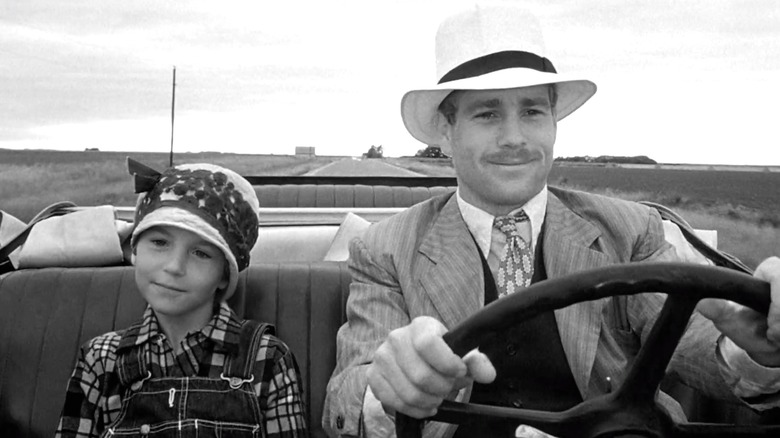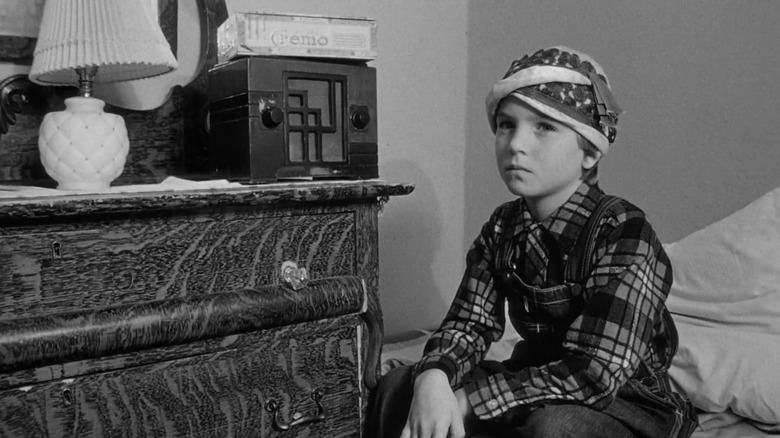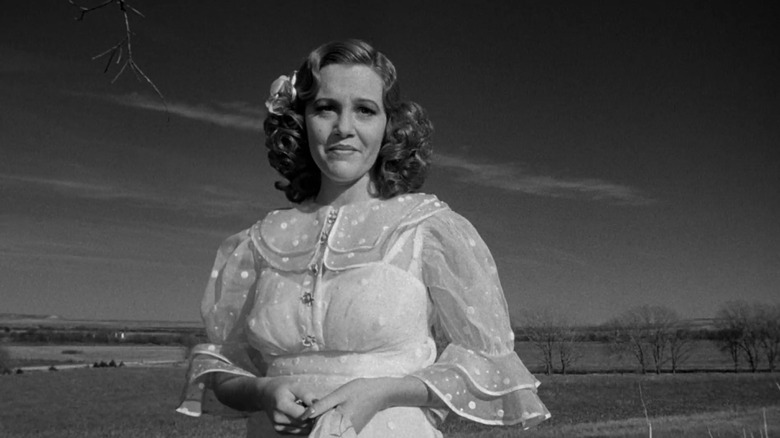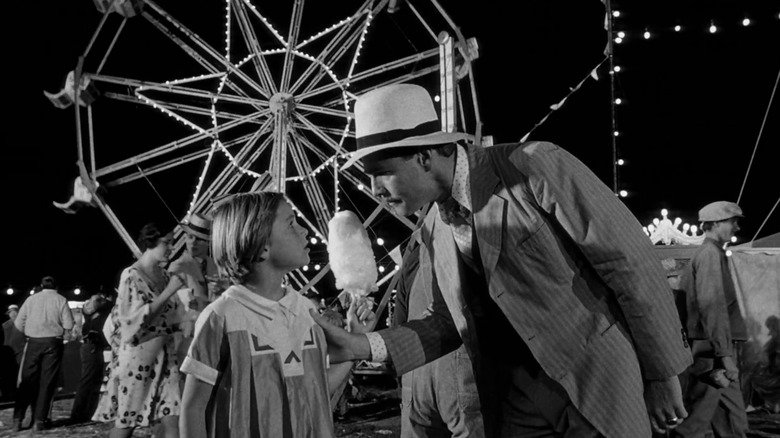The Daily Stream: Paper Moon Is The Road To Movie Heaven, With The Late Peter Bogdanovich As Your Driver
(Welcome to The Daily Stream, an ongoing series in which the /Film team shares what they've been watching, why it's worth checking out, and where you can stream it.)
The Movie: "Paper Moon"
Where You Can Stream It: Amazon Prime Video, DirecTV, Showtime/The Roku Channel
The Pitch: Real-life father and daughter Ryan and Tatum O'Neal star as a small-time grifter and his unlikely accomplice in this spirited road movie set during the Great Depression. Directed by Peter Bogdanovich, who passed away this month, "Paper Moon" is an essential slice of '70s cinema. Stephen King writes fictional alter egos who adore Bogdanovich's "The Last Picture Show," but I've always held more of a soft spot for "Paper Moon"—and I'm not the only one here on /Film who feels that way.
The elder O'Neal plays Moses or "Moze" Pray, whose name belies an irreligious tendency to con widows out of cash for "deluxe edition" Bibles. His "chariot" is a sputtering jalopy. As he walks up to where 9-year-old Addie Loggins stands over her mother's open grave, he snatches flowers from another nearby grave. That tells you everything you need to know about Moze.
This is, as the title song tells us, "a Barnum and Bailey world, just as hollow as it can be." It has already toughened Addie, this fierce little girl whose face is initially frozen in a Dust Bowl squint. She's the kind of kid who takes it upon herself to light up a cigarette in bed. More than one person confuses her for a boy. Moze, who could be her father, finds himself in a position of having to work off a debt of $200 to her, and that sets the stage for a picaresque adventure buoyed by the delightful antagonism between them.
Why It's Essential Viewing
To some benighted TV viewers, Bogdanovich might be more recognizable for his role as the therapist's therapist on "The Sopranos" than for his directorial work. His name sometimes gets crowded out and his work sometimes gets overlooked in superficial summaries of the New Hollywood era — that period in American cinema from roughly 1967 to 1982 when a breed of maverick young filmmakers, the so-called "Movie Brats," began exerting more creative control within the studio system.
It's easy to rattle off household names like Francis Ford Coppola, George Lucas, Steven Spielberg, and Martin Scorsese, but there are many other directors whose creativity thrived onscreen during those fertile New Hollywood years, and Bogdanovich is one of them.
"Paper Moon" is entry-level Bogdanovich. It's the perfect starting point for a discovery or rediscovery of his early filmography. With this movie, Tatum O'Neal became the youngest actor to ever compete for an Academy Award and win. She's a natural, and when she finally breaks a smile, it opens a ray of light in the film.
Madeline Kahn, who co-stars as Trixie Delight, was nominated with O'Neal in the Best Supporting Actress category. Trixie, we're told, puts out like a gum machine, and she has much to say about "bone structure." Her arrival further complicates matters between Moze and Addie, and when you see the scene with her on a grassy hillside, allowing herself to be vulnerable in front of Addie, it's easy to see why the Academy sought to honor Kahn along with her young, preternaturally gifted scene partner.
Grifters with Gold Hearts
The Great Plains setting of "Paper Moon" allows for a beautiful composition of shots, whether it be two-shots of Moze and Addy in the car with wide-open Kansas landscapes behind them, or a tracking shot as they stroll through a desolate town. László Kovács' black-and-white cinematography is, in a word, stunning. Along the way, Moze finds himself rassling Randy Quaid barefoot and eluding a sheriff (John Hillerman of "Magnum P.I." fame) whose twin brother is a bootlegger.
These are the kinds of colorful characters that give "Paper Moon" its rough-edged charm. Beneath the movie's callused exterior of grifters united by self-interest lies a heart of gold. Watching it again made me extremely wistful for a lost time and place — and lost people. There's a scene toward the end that's reminiscent of Jean-Luc Godard's "Breathless," and breathless is how I felt as the full weight of time's inexorable march pressed in on me during this film.
An image of Bogdanovich that always stayed with me is one that's relayed in Peter Biskind's book, "Easy Riders, Raging Bulls: How the Sex-Drugs-and-Rock 'N Roll Generation Saved Hollywood." Biskind profiled Bogdanovich, Coppola, and William Friedkin for the book (among many other notable names), and the three directors were not fans of the warts-and-all end product. But it's still impossible to forget the image of Coppola, Friedkin, and future "Exorcist" star, Ellen Burstyn, leaving a party in a stretch limo, while Bogdanovich left the same party in a station wagon driven by Polly Platt.
The Station Wagon to Hollywood Heaven
Platt, who was married to Bogdanovich until "The Last Picture Show," was the production designer and uncredited costume designer for "Paper Moon." It was she who first recommended both the novel, "Addie Pray" (the source material for "Paper Moon"), and O'Neal for the role of Addie. In the mind's-eye, in that station wagon, she and Bogdanovich themselves cut a figure like that of Addie and Moze in their jalopy in "Paper Moon."
Coppola had won the limo in a bet with Paramount Pictures — the studio that almost fired him — when "The Godfather" crossed the $50-million mark at the box office. As the book tells it, he was spritzing champagne and they were driving along the Sunset Strip, singing, "Hooray for Hollywood," the same song that their contemporary, Robert Altman, used to close "The Long Goodbye."
The limo and the station wagon pulled up next to each other at a stoplight, and Friedkin stuck his head out of the limo's sun roof. He started touting his Oscar success and quoting a review of his film, "The French Connection," which beat Bogdanovich's "The Last Picture Show" for Best Picture and Director at the 44th Academy Awards.
Bogdanovich, in turn, stuck his head out the window of the station wagon and reciprocated by quoting a review of his own film and its multiple nominations, quipping, "My movie's better than yours!"
When it comes to "Paper Moon," he still has bragging rights over most other directors in the class of '73. To paraphrase a song released the year of "Paper Moon:" "If there's a Hollywood heaven, well, you know they've got a hell of a film crew." And maybe Bogdanovich has got a director's chair up there somewhere — or a crescent moon made out of paper — where he's smiling down on us all.



